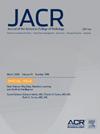ACR Appropriateness Criteria® Dementia: 2024 Update
IF 4
3区 医学
Q1 RADIOLOGY, NUCLEAR MEDICINE & MEDICAL IMAGING
引用次数: 0
Abstract
Dementia is defined by significant chronic or acquired impairment in a single domain or loss of two or more cognitive functions by brain disease or injury. It is a common chronic syndrome in adults and constitutes the fifth leading cause of death in patients >65 years of age. Multiple etiologies of dementia exist, most notably Alzheimer disease, frontotemporal dementia, and dementia with Lewy bodies, as well as other neurologic diseases such as vascular dementia and normal pressure hydrocephalus. In addition to aiding clinicians in selecting the most appropriate imaging test for patients suspected of one of these dementia syndromes, this document highlights the most appropriate initial imaging tests for patients with suspected mild cognitive impairment and rapidly progressive dementia, as well as the most appropriate pre- and posttreatment imaging tests for patients undergoing therapy with antiamyloid monoclonal antibodies.
The American College of Radiology Appropriateness Criteria are evidence-based guidelines for specific clinical conditions that are reviewed annually by a multidisciplinary expert panel. The guideline development and revision process support the systematic analysis of the medical literature from peer reviewed journals. Established methodology principles such as Grading of Recommendations Assessment, Development, and Evaluation or GRADE are adapted to evaluate the evidence. The RAND/UCLA Appropriateness Method User Manual provides the methodology to determine the appropriateness of imaging and treatment procedures for specific clinical scenarios. In those instances where peer reviewed literature is lacking or equivocal, experts may be the primary evidentiary source available to formulate a recommendation.
ACR适当性标准®痴呆症:2024年更新
痴呆症的定义是由于脑部疾病或损伤导致的单一领域的严重慢性或获得性损伤或两种或两种以上认知功能的丧失。这是成人中一种常见的慢性综合症,是65岁以上患者死亡的第五大原因。痴呆有多种病因,最著名的是阿尔茨海默病、额颞叶痴呆和路易体痴呆,以及其他神经系统疾病,如血管性痴呆和常压脑积水。除了帮助临床医生为疑似痴呆综合征的患者选择最合适的影像学检查外,本文件还强调了疑似轻度认知障碍和快速进展性痴呆患者最合适的初始影像学检查,以及接受抗淀粉样蛋白单克隆抗体治疗的患者最合适的治疗前和治疗后影像学检查。美国放射学会适当性标准是针对特定临床条件的循证指南,每年由多学科专家小组审查。指南的制定和修订过程支持对同行评议期刊的医学文献进行系统分析。已建立的方法原则,如建议分级评估,发展和评估或GRADE适用于评估证据。兰德/加州大学洛杉矶分校适当方法用户手册提供了确定特定临床情况下成像和治疗程序的适当性的方法。在同行评议文献缺乏或模棱两可的情况下,专家可能是制定建议的主要证据来源。
本文章由计算机程序翻译,如有差异,请以英文原文为准。
求助全文
约1分钟内获得全文
求助全文
来源期刊

Journal of the American College of Radiology
RADIOLOGY, NUCLEAR MEDICINE & MEDICAL IMAGING-
CiteScore
6.30
自引率
8.90%
发文量
312
审稿时长
34 days
期刊介绍:
The official journal of the American College of Radiology, JACR informs its readers of timely, pertinent, and important topics affecting the practice of diagnostic radiologists, interventional radiologists, medical physicists, and radiation oncologists. In so doing, JACR improves their practices and helps optimize their role in the health care system. By providing a forum for informative, well-written articles on health policy, clinical practice, practice management, data science, and education, JACR engages readers in a dialogue that ultimately benefits patient care.
 求助内容:
求助内容: 应助结果提醒方式:
应助结果提醒方式:


